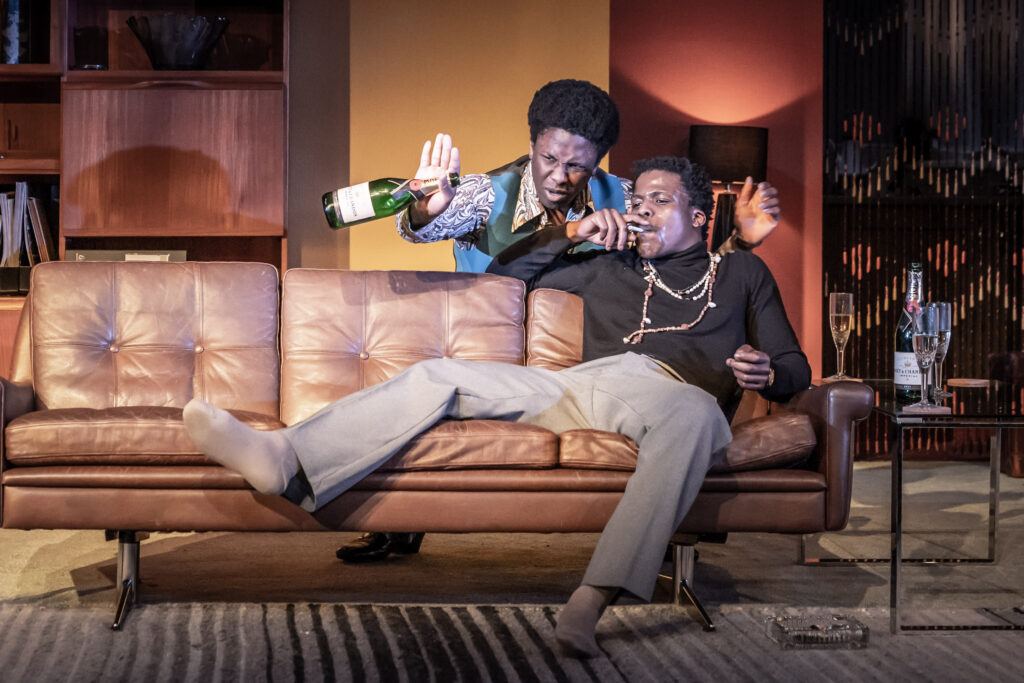Hampstead Theatre, London – until 10 July 2021
Reviewed by Alun Hood
2**
Not seen on stage since it’s 1975 Hampstead Theatre premiere, Alfred Fagon’s punchy tale of a pair of young Black Londoners trying to make the big bucks via whatever means necessary in a hostile, stiflingly white-dominated world, is a commendably bold choice to reopen this North London venue. Set against a fascinating if unedifying socio-political landscape where undisguised racism ran unchecked thanks in no small part to the notorious ‘Rivers Of Blood’ speech of Enoch Powell, the toxic shockwaves from which were still reverberating throughout an unstable UK nearly a decade later, it’s a challenging piece. Powell is referenced several times in Fagon’s text, as is the 1973 Test Match triumph of the West Indies cricket team, thereby reflecting what were arguably the nadir and the zenith of the 1970s British Black experience.
Given how high all these stakes are, I wish I could be more enthusiastic about the actual play itself, which starts off like a slightly off-kilter sitcom (an impression borne out by Simon Kenny’s garishly kitschy 70s living room setting) where late-teen wheeler dealer Shakie is getting a tongue-lashing from his upwardly mobile, older girlfriend Jackie, by whom he has fathered a child. The arrival of his brash sidekick, would-be music promoter Stumpie, ups the comic ante further, at least until he starts an alarming aggression towards Jackie. The second act degenerates into edgier territory -the increasingly desperate men hold the moneyed Jackie hostage with plans to sell her off to rich white men- but alas with all the finesse and subtlety of a sledgehammer.
It’s a wildly uneven ride, the tone of the writing veering from polemic to poetic to just plain nasty and all the way back again within a few lines of dialogue. The unlikeable characters feel more like mouthpieces than real people which might be less problematic if Fagon hadn’t sought to invest them with the weight of so much history: one minute they’re snarling abuse at each other and the next they are cataloguing unforgivable white-on-Black transgressions that, while an understandable source of fury, carry little dramatic momentum as it sounds as the though the actors are spouting extended Wikipedia quotations. Not that they had Wikipedia in the 1970s of course.
The play is undoubtedly a product of its time, and the casual anti-Semitism, repeated throwaway rape references and perhaps above all, the repellent misogyny are undoubtedly jarring to modern ears. I think Fagon’s point was that oppression never really ends, the oppressed continuing with the oppressor’s appalling behaviour ad infinitum, but Dawn Walton’s slightly unfocused, sluggishly paced production – long on volume, short on subtlety – doesn’t elucidate.
A blandly unconvincing performance from Nickcolia King-N’Da as central man-child Shakie doesn’t help: there is real comic mileage in a scene where, by phone, he tries to verbally seduce the wife of a business associate while simultaneously trying to ascertain the whereabouts of items he has ordered, but it went for very little the night I saw it, the tiresome procedure of using a rotary dial phone getting the only true laughs. Toyin Omari-Kinch injects some much needed energy as the unstable Stumpie, and Natalie Simpson impressively charts Jackie’s disintegration before our very eyes.
Black British playwrights are shamefully underserved by most of the UK’s mainstream theatres so Hampstead programming The Death of a Black Man is, on the one hand, welcome, but I can’t help but wish that they had given this slot to an up-and-coming Black writer rather than disinterring this dated hot mess of a drama. A neglected masterpiece has not been recovered.

